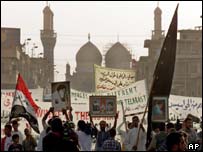
There is growing pressure for self-rule in Iraq
|
Iraq's Interim Governing Council (IGC) has opted for a nine-member rotating presidency made up of representatives of the country's ethnic groups.
The 25-member council - set up by the US-led coalition - said electing a single president was a priority when it formally opened on 13 July.
But members could not agree on who that leader should be, so instead they opted for a rotating presidency system similar to that of the European Union.
The council will now decide in which order the five Shia Muslim, two Sunni Muslims and two Kurdish representatives will serve Iraq's people.
Kurdistan Democratic Party (KDP) spokesman Hoshyar Zebari said: "We have chosen a committee of nine members, and each member will serve as president for one month."
Broad representation
The Shia representatives are:
- Ahmad Chalabi, leading figure in the Pentagon-backed Iraqi National Congress
- Iyad Allawi, head of the Iraqi National Accord Movement
- Abdul Aziz al-Hakim, number two in the Supreme Assembly of the Islamic Revolution in Iraq
- Ibrahim Jafari, spokesman for the Dawa party
- Mohammed Bahr al-Uloom, a liberal cleric.
The Sunnis are former Foreign Minister Adnan Pachachi and Mohsen Abdul Hamid, secretary general of the Islamic Party.
The Kurds are KDP chief Massoud Barzani and Patriotic Union of Kurdistan leader Jalal Talabani.
The council can appoint cabinet ministers, formulate economic policies and is charged with producing a process to write a constitution that would pave the way for a general election.
Council members said they might opt for the presidential rotation to proceed in alphabetical order to allay potential allegations of favouritism.

